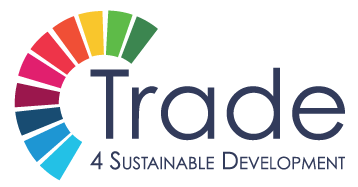Publications
Peer-reviewed Articles published on Journals with the support of TRADE4SD project
Trade and sustainability: analysing Specific Trade Concerns (STCs) through the Theory of Change
Authors:
Maria Rosaria PUPO D’ANDREA, Roberto HENKE, Angelo QUARTO and Federica DEMARIA
Where:
Studies in Agricultural Economics 127 (2025) 53-66
Link in Open Access:
https://doi.org/10.7896/j.3045
Abstract: This study explores the link between trade and sustainability, focusing on Sanitary and Phytosanitary (SPS) measures within the WTO framework. It highlights the importance of Specific Trade Concerns (STCs) as a dispute management tool and their implications for sustainability. Analysing three case studies – EU-China (African Swine Fever), EU-India (Methyl Bromide fumigation), and Senegal-EU (mango exports) – the paper identifies divergent, negotiable trade-offs, and cooperative behaviours among trading partners. The study applies the Theory of Change (ToC) framework to the three STCs to assess the effective ness of linking trade with sustainability goals. Findings reveal that sustainability considerations are critical for resolving STCs and achieving policy coherence and integration. The EU-Senegal case demonstrates ToC alignment, showcasing the success of a cooperative approach in addressing sustainability. In contrast, unsolved issues in the EU-China and EU-India cases high light faults in sustainability integration. The study underlines STCs’ potential for modernising the WTO by fostering the linkages between trade and sustainability through institutional change.
Does sustainability fit in the EU-Tunisia trade relations? Evidence from the olive oil sector
Authors:
Fort, F., Manetti, I., Pupo D’Andrea, M.R., Henke, R., D’Annolfo, R., Morandi, F., Demaria, F. (2025). Does sustainability fit in the EU-Tunisia trade relations? Evidence from the olive oil sector.
Where:
New Medit, Mediterranean Journal of Economics, Agriculture, Environment and Food, 2025 n. 1
Link in Open Access:
https://doi.org/10.30682/nm2501e
Abstract: Trade agreements between the European Union (EU) and developing countries are often used to promote sustainable development within economic cooperation. The EU-Tunisia trade relations have a long history, starting with the Association Agreement in place and the ongoing negotiations for the new Deep and Comprehensive Free Trade Area (DCFTA) agreement, for further liberalizing the agricultural sector. This study investigates the effects on sustainability of these bilateral relations, with a focus on Tunisian olive oil value chain, considering both the current Free Trade Agreement (FTA) impacts and the future DCFTA agreement expected effects. A two-steps qualitative process consisting of a desk analysis and stakeholders’ consultations has been undertaken to report socioeconomic and environmental effects, suggesting policy interventions to be considered within the negotiations framework. Main actions needed encompass an inclusive renovation of Tunisian olive oil sector, a rethinking of exports’ tariff quota system to the EU, with special attention to organic olive oil, and water efficient cultivation systems interventions.
Interlinkages Between Agri-Food Trade and the SDGs at the Global, Regional and Local Level
Authors:
Armah N. A. Ralph, Quartey Peter, Turkson Ebo Festus, Abbey N. Emmanuel, Mawuenyega M. Butu, Huan-Niemi Ellen
Where:
Journal of International Development Volume 37, Issue 4, May 2025
Link in Open Access:
Interlinkages Between Agri‐Food Trade and the SDGs at the Global, Regional and Local Level
Abstract: This study is a structured review on the interlinkages between agri-food trade and the SDGs in the environmental, social and economic dimensions to identify any missed opportunities that agri-food trade could positively impact the SDGs and provide policy guidance for the missed opportunities at the global, regional and national levels. A great deal of diversity in the papers at the global level, and papers at the regional level are similar, but there is additional analysis on promoting regional markets and value chains. Papers at the local level are product-specific to emphasise how the trade of specific agricultural commodities would affect the achievement of particular SDGs in question. There is a concern regarding whether agri-food trade can promote sus-tainability and the attainment of the SDGs. This is particularly important given that gains from trade are not entirely equitable. Questions relating to concrete innovations, policies and behavioural changes that can ensure systemic transformations remain critical and need to be addressed.

